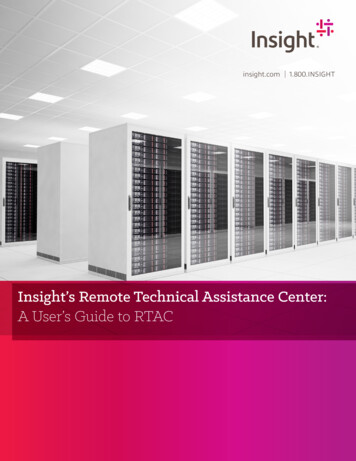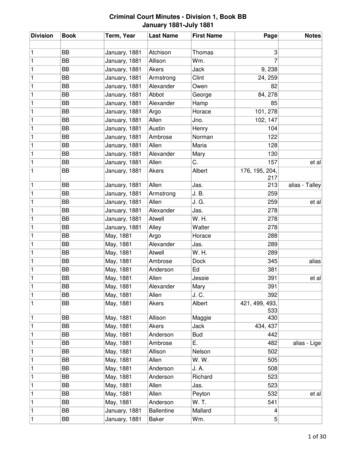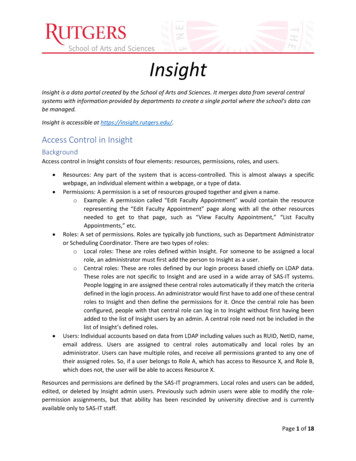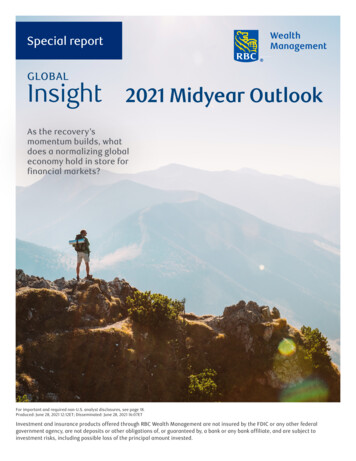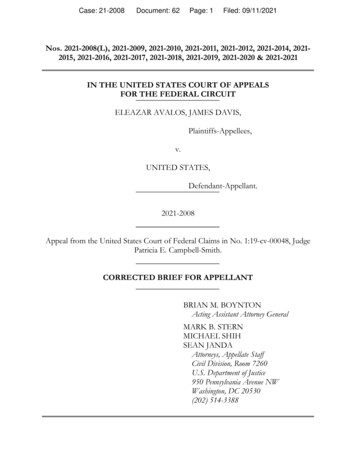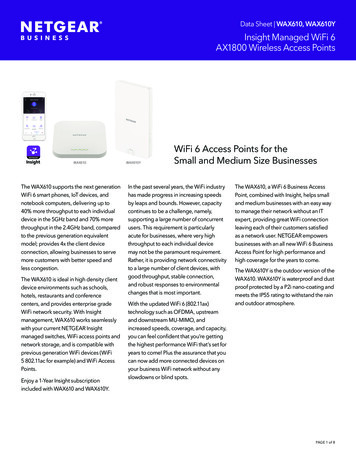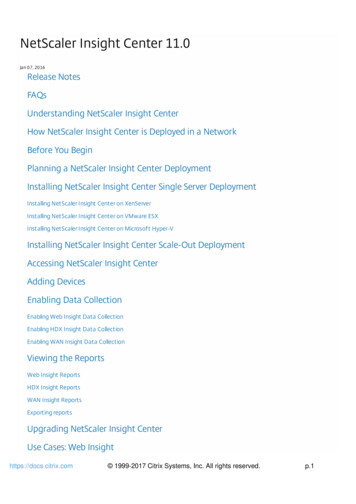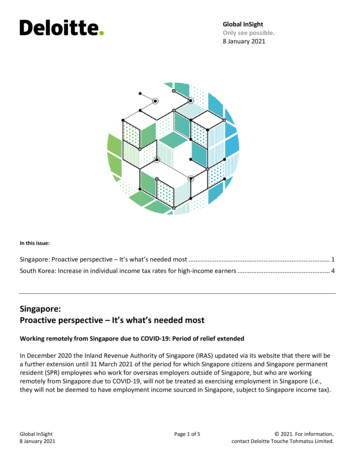
Transcription
Global InSightOnly see possible.8 January 2021In this issue:Singapore: Proactive perspective – It’s what’s needed most . 1South Korea: Increase in individual income tax rates for high-income earners . 4Singapore:Proactive perspective – It’s what’s needed mostWorking remotely from Singapore due to COVID-19: Period of relief extendedIn December 2020 the Inland Revenue Authority of Singapore (IRAS) updated via its website that there will bea further extension until 31 March 2021 of the period for which Singapore citizens and Singapore permanentresident (SPR) employees who work for overseas employers outside of Singapore, but who are workingremotely from Singapore due to COVID-19, will not be treated as exercising employment in Singapore (i.e.,they will not be deemed to have employment income sourced in Singapore, subject to Singapore income tax).Global InSight8 January 2021Page 1 of 5 2021. For information,contact Deloitte Touche Tohmatsu Limited.
The relief initially was announced by the IRAS on 6 April 2020 and was intended to apply until 30 September2020. On 28 July 2020, the IRAS confirmed an extension to 31 December 2020 (see our previous NewsFlash of12 August 2020).URL: yfrom-singapore-due-to-covid-191.pdfThe further extension to 31 March 2021 is subject to meeting additional qualifying conditions.Period of stay in Singapore does not extend beyond 31 December 2020: The following conditions announcedby the IRAS on 6 April 2020 remain valid and must be met by Singapore citizens and SPR employees who returnto Singapore to work remotely during the COVID-19 pandemic:1. There is no change in the contractual terms governing the overseas employment of the individualsbefore or after their return to Singapore; and2. This is a temporary work arrangement due to COVID-19.Period of stay in Singapore extends beyond 31 December 2020: The following additional qualifying conditionsannounced by the IRAS must be met by Singapore citizens and SPR employees to qualify for the tax concessionthrough 31 March 2021:3. The work performed by the individuals during their stay in Singapore would have been performedoverseas if not for the travel restrictions caused by COVID-19;4. The individuals will leave Singapore as soon as they are able to do so; and5. The employment income earned during the individual’s stay in Singapore from 1 January 2021 through31 March 2021 is subject to tax in the country where the individual would have been working for theoverseas employer.Where all of the conditions (1) to (5) are met, the individual’s employment income will not be taxable inSingapore from the date of return to Singapore through either the date of departure from Singapore, or 31March 2021, whichever is earlier. Where an individual meets conditions (1) and (2) but does not meet all of theadditional conditions (3) to (5), only employment income for the period up to 31 December 2020 will not betaxable in Singapore.The relevant supporting documents to substantiate that the qualifying conditions are met must be retainedand provided to the IRAS upon request. The general taxation rules for income earned in Singapore will applywhere the conditions are not met.Deloitte’s viewIn these unprecedented times, these are welcome measures by the IRAS to manage the additional taxresponsibilities of employers and employees affected by the COVID-19 pandemic.Global InSight8 January 2021Page 2 of 5 2021. For information,contact Deloitte Touche Tohmatsu Limited.
If you require assistance to determine if the conditions for relief are met, please contact us and we will bepleased to assist.Should you have any comments or questions arising from this newsletter, please contact either the listednames below, or any member of the Singapore Tax & Legal team.URL: /tax-legal-team.html—Jill Lim (Singapore)Southeast Asia GES LeaderDeloitte Singaporejilim@deloitte.comSabrina Sia (Singapore)Singapore GES LeaderDeloitte Singaporessia@deloitte.comChristina Karl (Singapore)PartnerDeloitte Singaporeckarl@deloitte.comDion Thai (Singapore)PartnerDeloitte Singaporedthai@deloitte.comMichele Chao (Singapore)PartnerDeloitte Singaporemicchao@deloitte.comJoanne Lee (Singapore)PartnerDeloitte Singaporejoalee@deloitte.comLegal servicesDeloitte Legal International Pte. Ltd. (a licensed Foreign Law Practice) and Sabara Law LLC are members ofDeloitte Legal, which is the international network of legal practices working with Deloitte all over the world.Deloitte Legal International Pte. Ltd. and Sabara Law LLC provide only legal services; and are legally separateand independent from other Deloitte entities.URL: https://www.deloittelegal.com.sg/URL: http://www.sabaralaw.com.sg/—Foreign Law PracticeDeloitte Legal International focuses oninternational cross-border legal matters underEnglish and local law across Southeast Asia.Singapore Law PracticeSabara Law LLC focuses on Singapore Law matters.Rashed Idrees (Singapore)Managing DirectorDeloitte Legal International Pte. Ltd.ridrees@deloittelegal.com.sgYeoh Lian Chuan (Singapore)Managing DirectorSabara Law LLClcyeoh@sabaralaw.com.sgGlobal InSight8 January 2021Page 3 of 5 2021. For information,contact Deloitte Touche Tohmatsu Limited.
South Korea:Increase in individual income tax rates for high-income earnersOverviewOn July 22, 2020, the Korean Ministry of Strategy and Finance released its proposed tax law revisions. Thefollowing is a key area of proposed 2020 tax law revisions relevant to Global Employer Services. The proposedtax law revisions were approved by the Korean National Assembly on December 2, 2020.What is the change?Under the current tax law, individual income tax rates on global income range from 6% to 42%. In addition, alocal income tax surcharge is also assessed at a rate of 10% of the income tax liability. Thus, the top marginaltax rate including local income tax is 46.2% on taxable income of 500 million won or more.According to the tax law revision, there is an increase in the highest income tax rate and an adjustment of thetax bracket. Thus, tax rates range from 6% to 45%, and the top marginal tax rate is 49.5%, including localincome tax on taxable income exceeding 1 billion won. It will be applicable to income earned from January 1,2021.CurrentTax base (KRW)12 million won or lessMore than 12 million won, but not exceeding 46 million wonMore than 46 million won, but not exceeding 88 million wonMore than 88 million won, but not exceeding 150 million wonMore than 150 million won, but not exceeding 300 million wonMore than 300 million won, but not exceeding 500 million wonMore than 500 million wonTax rates6%15%24%35%38%40%42%RevisedTax base (KRW)12 million won or lessMore than 12 million won, but not exceeding 46 million wonMore than 46 million won, but not exceeding 88 million wonMore than 88 million won, but not exceeding 150 million wonMore than 150 million won, but not exceeding 300 million wonMore than 300 million won, but not exceeding 500 million wonGlobal InSight8 January 2021Page 4 of 5Tax ratesSame 2021. For information,contact Deloitte Touche Tohmatsu Limited.
Tax base (KRW)More than 500 million won, but not exceeding 1 billion wonMore than 1 billion wonTax rates42%45%Deloitte’s viewDue to the increased highest marginal tax rate, the revision would have an impact on the high-income earners,especially foreigners who are no longer eligible to elect the flat tax-rate method by exceeding five years fromtheir Korean employment start date. In this regard, companies need to consider the expected tax-cost increasefor foreign expatriates working in Korea.—Min Soo Seo (Seoul)PartnerDeloitte Koreamseo@deloitte.comDong Yoon Kim (Seoul)Senior ManagerDeloitte Koreadongyokim@deloitte.comAbout DeloitteDeloitte refers to one or more of Deloitte Touche Tohmatsu Limited (“DTTL”), its globalnetwork of member firms, and their related entities (collectively, the “Deloitteorganization”). DTTL (also referred to as “Deloitte Global”) and each of its member firmsand related entities are legally separate and independent entities, which cannot obligateor bind each other in respect of third parties. DTTL and each DTTL member firm andrelated entity is liable only for its own acts and omissions, and not those of each other.DTTL does not provide services to clients. Please see www.deloitte.com/about to learnmore.Deloitte is a leading global provider of audit and assurance, consulting, financial advisory,risk advisory, tax and related services. Our global network of member firms and relatedentities in more than 150 countries and territories (collectively, the “Deloitteorganization”) serves four out of five Fortune Global 500 companies. Learn howDeloitte’s approximately 312,000 people make an impact that matters atwww.deloitte.com.This communication contains general information only, and none of Deloitte ToucheTohmatsu Limited (“DTTL”), its global network of member firms or their related entities(collectively, the “Deloitte organization”) is, by means of this communication, renderingprofessional advice or services. Before making any decision or taking any action that mayaffect your finances or your business, you should consult a qualified professional adviser.No representations, warranties or undertakings (express or implied) are given as to theaccuracy or completeness of the information in this communication, and none of DTTL,its member firms, related entities, employees or agents shall be liable or responsible forany loss or damage whatsoever arising directly or indirectly in connection with anyperson relying on this communication. DTTL and each of its member firms, and theirrelated entities, are legally separate and independent entities.Global InSight8 January 2021Page 5 of 5 2021. For information,contact Deloitte Touche Tohmatsu Limited.
Deloitte is a leading global provider of audit and assurance, consulting, financial advisory, risk advisory, tax and related services. Our global network of member firms and related entities in more than 150 countries and territories (collectively, the "Deloitte organization") serves four out of five Fortune Global 500 companies. Learn how
